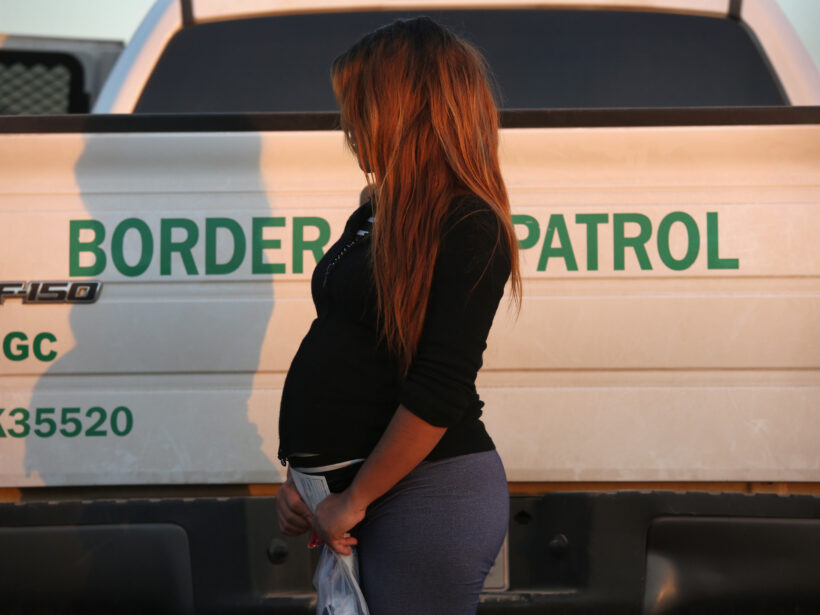
redo Jump to...
print Print...
NOTE: An injunction is a legal order issued by a court that requires a person or entity to either do something specific or refrain from doing something.
(by Devin Dwyer, ABC News) – The Supreme Court on Thursday said it would hear expedited oral arguments next month over President Donald Trump’s emergency request to rollback nationwide injunctions [by district judges in Washington, Massachusetts and Maryland] against his executive order to end birthright citizenship. [The injunctions stay in place until the court rules on the emergency request, meaning the executive order continues to be blocked nationwide while the case is pending].
The nation’s highest court set arguments for May 15 at 10 a.m.
The move by the justices sets the stage for a decision by this summer on three separate district court injunctions that had blocked the administration from moving forward with its plan [to end birthright citizenship, which grants] citizenship to children born on U.S. soil to parents who do not have permanent legal status.
Trump had asked the Supreme Court to allow the administration to, at the very least, begin planning for the change. He also took aim at the universal lower court mandates [orders] that he argued exceeded their authority.
“This Court should declare that enough is enough before district courts’ burgeoning reliance on universal injunctions becomes further entrenched,” Trump’s acting solicitor general wrote in the application. “The Court should stay* the district courts’ preliminary injunctions except as to the individual plaintiffs and the identified members of the organizational plaintiffs (and, if the Court concludes that States are proper litigants, as to individuals who are born or reside in those States).” [*A stay is a court order that temporarily halts or suspends a legal proceeding or the enforcement of a court order. It essentially puts the case on hold until a specific condition or event occurs].
“At a minimum, the Court should stay the injunctions to the extent they prohibit agencies from developing and issuing public guidance regarding the implementation of the Order. Only this Court’s intervention can prevent universal injunctions from becoming universally acceptable,” she added.
…Earlier this month, a coalition of 22 Democrat led states and immigrant advocates had asked the Supreme Court to reject Trump’s emergency request to rollback a nationwide injunction against his executive order ending birthright citizenship.
[The AP noted, “Several justices have raised concerns in the past about nationwide, or universal, injunctions, but the court has never ruled on the matter.”].“Being directed to follow the law as it has been universally understood for over 125 years is not an emergency warranting the extraordinary remedy of a stay,” they wrote. “This Court should deny the federal government’s request. Many aspects of constitutional interpretation are hotly debated, but not the merits question in this case. For over a century, it has been the settled view of this Court, Congress, the Executive Branch, and legal scholars that the Fourteenth Amendment’s Citizenship Clause guarantees citizenship to babies born in the United States regardless of their parents’ citizenship, “allegiance,” “domicile,” immigration status, or nationality.”
Published at ABC News on April 17. Reprinted here for educational purposes only. May not be reproduced on other websites without permission.
Questions
1. What did district judges in Washington, Massachusetts and Maryland issue similar injunctions on in relation to President Trump’s executive order on birthright citizenship?
2. How did the Supreme Court respond to the Trump administration’s request to stay the lower district courts’ injunctions?
3. The Supreme Court typically only hears oral arguments between October and April and makes rulings before the court breaks for the summer at the end of June – and the vast majority of emergency applications are resolved without the justices holding an argument.
The Trump administration has not yet asked the justices to settle the constitutionality of Trump’s order but has asked the high court to rein in lower judges that went beyond the parties who sued to block the president’s order nationwide.
On what date will the justices hear oral arguments?
4. How many Democrat led states joined the ACLU, immigrant advocates and several expectant mothers, some of whom are not in the country legally, in the challenge against Trump’s executive order ending birthright citizenship?
5. Those challenging the Trump administration argue that the executive order is unconstitutional, violates the 14th Amendment, and contradicts over a century of legal precedent. They contend that birthright citizenship is a fundamental right and that universal injunctions are necessary to maintain consistent citizenship rules nationwide (from a Grok explanation). Watch the videos under “Resources” below. What do you think? Do you support or oppose the president’s attempt to end birthright citizenship? Explain your answer.
CHALLENGE: The Trump administration’s appeal to the Supreme Court will most likely be decided before the end of June. Then, the challenge to the constitutionality of the executive order ending birthright citizenship will eventually make it to the Supreme Court. Follow updates on this ongoing story.
Background
Read President Trump’s Executive Order ending birthright citizenship.
- Read the commentary “Where does the concept of birthright citizenship come from?” AND
- “Birthright Citizenship: An Overview” (pdf version)
From Dec. 12, 2024: “Trump says he will end birthright citizenship on day 1”
The main difference between birthright citizenship and acquiring citizenship in the United States is that birthright citizenship is automatic, while acquiring citizenship requires meeting certain requirements:
Birthright citizenship:
A person is automatically a U.S. citizen at birth if they are born in the United States to any non-citizen – or if at least one parent is a U.S. citizen at the time of their birth. This is known as jus soli (“right of the soil”) or jus sanguinis. [e.g. If your mother crosses the border illegally and gives birth to you even the same day, or flies to the U.S. to give birth, you are automatically granted U.S. citizenship.]
Acquiring citizenship:
A person can acquire citizenship after birth if they meet certain requirements, such as being under 18 years old and having a U.S. citizen parent. This process is called naturalization and requires an application. To become a naturalized citizen, a person must meet requirements such as being at least 18 years old, living in the United States for a certain amount of time, and passing a civics test. (from Generative AI from a Google search with sources including USCIS .gov and wikipedia)
Do you know what birth tourism is? Read about it: “Chinese flock to USA to give birth to U.S. citizens“
Resources
Watch Attorney Stephen Miller’s explanation of birthright citizenship. Miller is White House Deputy Chief of Staff for Policy and U.S. Homeland Security Advisor:
What is Birthright Citizenship And Why Is President Trump Trying To End It?
Daily “Answers” emails are provided for Daily News Articles, Tuesday’s World Events and Friday’s News Quiz.



